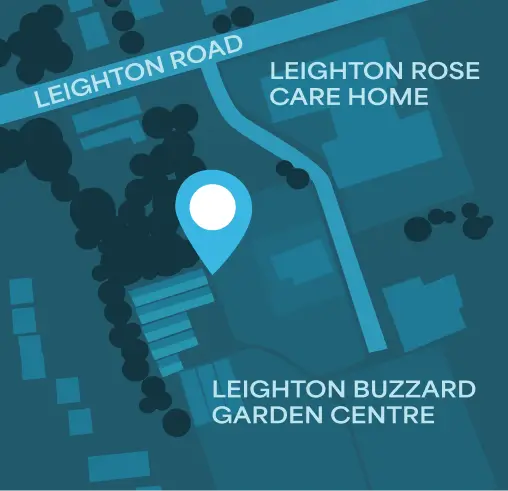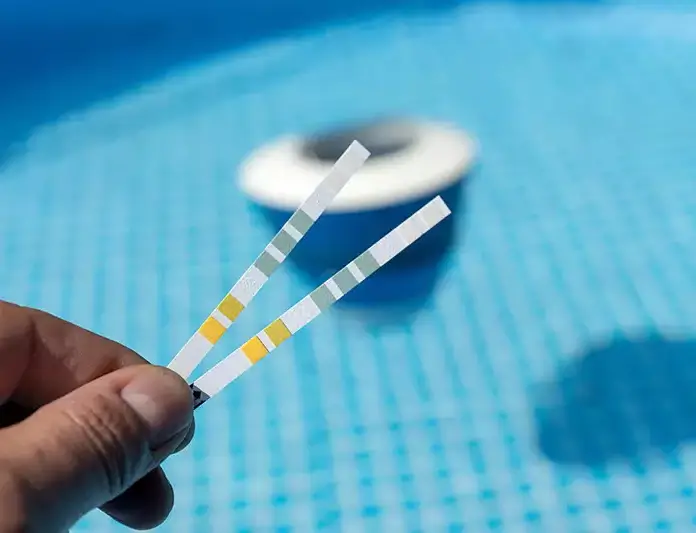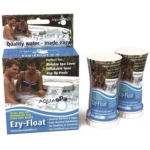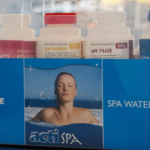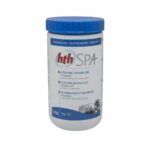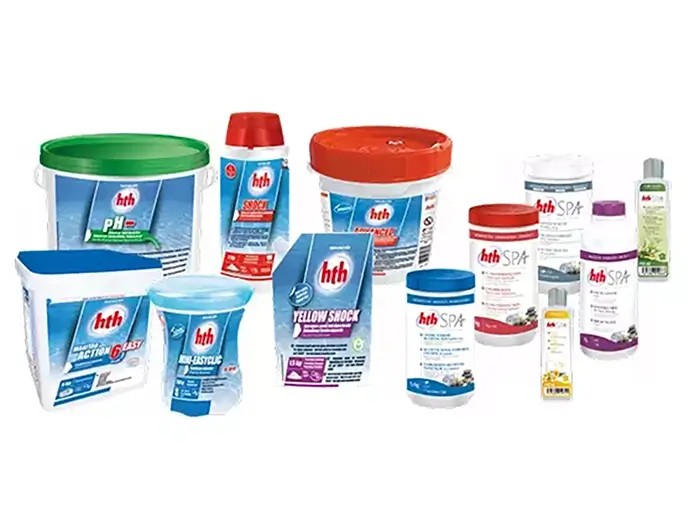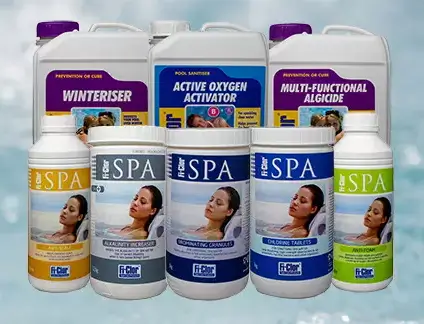Chlorine is everywhere. There’s swimming pool chlorine, hot tub chlorine and there’s even a small amount of chlorine in your tap water. Don’t worry, it’s not a bad thing, it’s there because chlorine is a safe and cost-effective way to sanitise water, even drinking water!
What is chlorine?
Good question! We all know that chlorine is the thing that keeps our local swimming pools clean, but do we actually know what it is? Well, apart from it being the chemical element of atomic number 17 (apparently), it is a naturally occurring chemical that is found across the earth and is essential for lots of things that you wouldn’t imagine.
How does it work?
Well the simple answer is that chlorine kills bacteria through a simple chemical reaction, we won’t bore you with the details. Suffice to say that it is the most economical way known to sanitise your pool or spa water.
Ever gone to a public swimming pool and thought that someone must have added too much chlorine because the smell was so strong? It might surprise you to learn, that’s not the reason for that strong smell at all – in fact, the smell might mean that MORE chlorine is needed! Chlorine releases ‘chloramines’ when it is faced with something to work on, which is what gives off the distinctive smell. These gasses can hover just above the water, which is why it can become an irritant to eyes and skin.
Something really important to remember is that for your chlorine (or in fact any sanitiser) to work efficiently, the pH of your water MUST be within the correct range. If it’s not, don’t be surprised if you start to develop issues in your pool or spa, don’t say we didn’t warn you!
What can it help with?
There are many things that chlorine can help with. For us in the swimming pool and spa industry it is the answer to many a problem from getting rid of algae, killing bacteria, fighting cloudy or foamy water, preventing your water from going green, bringing your water back to perfection after it has gone green, and the list goes on! We use it as a regular disinfectant and sanitiser (stabilised), and as a shock (unstabilised). Chlorine is our friend!
How do you use it?
That all depends on what you want it to do! Let’s take a look at the different types of chlorine that we use. We stock a well-known premium brand called Fi-Clor. Fi-Clor chemicals are top quality, and believe it or not this is very important when it comes to chemicals. Whilst it can be tempting to buy something cheap and cheerful online, do you really know what you’re getting? And just because it smells like chlorine, it doesn’t mean that that’s all there is in that tub…. Remember, you and your family and friends are going to get in that water, so it’s really important that you know what you are treating it with!
Azure Pools & Hot Tubs are an authorised Fi-Clor pool care centre so we can advise you properly when it comes to ensuring you’re using the right product.
Fi-clor provides top quality chemicals so that you can be confident that you are providing a safe and comfortable environment for everyone to swim or relax in.
Fi-clor produce a range of chlorine for you to use depending on what you would like to use it for. If you want a chlorine product that will sanitise your swimming pool water on an ongoing basis then you need a stabilised chlorine which you can dose directly into your swimming pool, or chlorine tablets which you would either put into your skimmer, or use with a floating dispenser
If you are looking for a stabilised chlorine for your hot tub, you can either use Fi-Clor hot tub granules and dose directly, or Fi-Clor hot tub tablets with a spa floating dispenser.
If you want to shock your water you will need an unstabilised chlorine; for your swimming pool you will need Fi-Clor Superfast Shock Granules or if it’s for your spa you will need Fi-Clor Superchlorinator
You could also use sodium hypochlorite, otherwise known as liquid chlorine, this is only sold in our shop and not online due to it’s hazardous properties and the difficulties this would cause with shipping.
Frequently asked questions about chlorine
What’s the difference between a stabilised and an unstabilised chlorine?
Well, the scientific answer is Cyanuric Acid; a stabilised chlorine has it, an unstabilised chlorine doesn’t! The cyanuric acid will ensure that your chlorine remains stable in the water for longer and protects it against the sun, which would otherwise burn it off quickly – which is exactly what happens with unstabilised chlorine.
Why would I use an unstabilised chlorine if stabilised chlorine lasts longer?
Very good question! The answer is that an unstabilised chlorine is a really effective way to ‘shock’ your water, which needs to be done on a regular basis. It also provides fast effective treatment for water that is green, cloudy, smelly, lacklustre, and generally nasty!
The stabilised chlorine will dose your water on an ongoing basis, the unstabilised chlorine will give it a boost and treat any problems.
What safety measures do I need to take?
It’s important to always wear gloves as chlorine neat (even in granular form) is an irritant to the skin, and may bleach your clothes. Be careful not to leave granules on your spa surfaces, and when dosing the product into a pool or hot tub be very careful that the wind isn’t blowing in your direction as you don’t want to get any in your eyes or breathe it in.
If you are using liquid chlorine you must be extra careful not to spill or splash it on yourself as it can burn your skin. Also be very careful with any of these chemicals around children, pets and wildlife.
What forms does it come in and which are best for me to use?
This is fully dependent on what you are using the chlorine for and what your personal preference is. Our pool team love to use sodium hypochlorite (liquid chlorine) because they’re professionals and know exactly what they’re doing, plus it is very fast acting which is convenient for them. However, it’s not something that we recommend to our customers unless they are confident in what they are doing due to its hazardous nature. The granulated shock is a safer way to shock your pool, and it’s better value for money.
With regards to stabilised chlorine you can either use tablets or granules depending on your preference. Tablets are easier and don’t rely on you remembering to dose the pool or spa. With either option don’t forget to check the chlorine levels on a regular basis and ensure that your pH is well balanced so that the chlorine can do it’s job properly.
How much chlorine should I use?
In a nutshell, you should follow the instructions on the packaging. Never be tempted to guess, or hope for the best, as by doing this with any chemical you can cause yourself more problems in the long run. It’s always best to work out the volume of water that your swimming pool or hot tub holds, and dose it accordingly. If you need any help with this then one of our experienced and knowledgeable pool team will be happy to help. Here at Azure we are all trained to give you the advice you need.
Is there a downside?
Chlorine is a well trusted cost-effective sanitiser used by millions of people for so many different reasons. But, if it’s not for you then we do have alternatives. Why would you decide against using chlorine? Some people just don’t like it. Whilst we have discussed the fact that if used correctly then it really shouldn’t be giving off much of an odour, some people just can’t get on with it, and if that’s you, that’s ok! If you’re not getting to grips with using chlorine properly, or if your water management isn’t the best and your pH isn’t well balanced, you can end up with problems. If your chlorine isn’t working properly, your water may smell, and you may suffer from sore eyes or itchy skin.
Is there a safe alternative to chlorine?
Absolutely! Bromine is another chemical that is well known and has been successfully used for years. Not to be confused with Bromide. That’s something completely different. Google it. Bromine is a very reactive element, but not as reactive as chlorine, therefore it can take longer to get to work in your hot tub. However, once it’s there it tends to stay there for longer. It also has a lower pH than chlorine meaning that it can be easier to keep your overall water chemistry balanced, which is nice.
Bromine tablets or bromine granules need to be used with Bromine test strips that will test the Bromine levels in your hot tub water and will also help you to balance your pH and alkalinity. Remember that any sanitiser is only as good as the water management behind it! You can also use bromine cartridges and accompanying conditioning cartridges for use with Artesian’s Spa Frog system.
Another fantastic alternative is Active Oxygen, which is our recommended chemical of choice here at Azure Pools and Hot Tubs. This is because Active Oxygen is the least chemically of all our sanitisers, and it doesn’t really feel like a chemical at all! There is an Active Oxygen system for Pools as well as Active Oxygen system for Hot Tubs Both are really simple to use, and are chlorine free! Fi-clor’s Active Oxygen systems were designed for people that love the water, whether that’s to swim in or for hydrotherapy, but for one reason or another don’t like chlorine. It is an MPS (monopersulfate) based treatment that is fast dissolving, has no odour, and doesn’t cause irritation to the eyes or skin. It is perfect for families and for those concerned with the effects of chlorine. You will of course need the appropriate MPS test strips to test your MPS levels and to ensure that all important water balance is correct
Does chlorine cause damage?
Chlorine itself used in the way it is designed to be used does not cause damage, although you must always take precautions to avoid harming yourself or others as described above. If used correctly chlorine will not cause any damage to your swimming pool or hot tub. What is much more likely to cause problems such as corrosion is poor water management and unbalanced pH- we can’t stress this enough!
In summary
Chlorine is an easy to use, cost effective chemical which, as long as your water management is good, you really can’t go wrong with. Chlorine is a must have. Even the chlorine free systems require a periodical chlorine shock (and if you want to know more about this then best to give us a call!)
To sum up, chlorine really is an essential component of your pool and hot tub maintenance routine. As ever, if you have any questions then give us a call and we’ll be happy to help.

